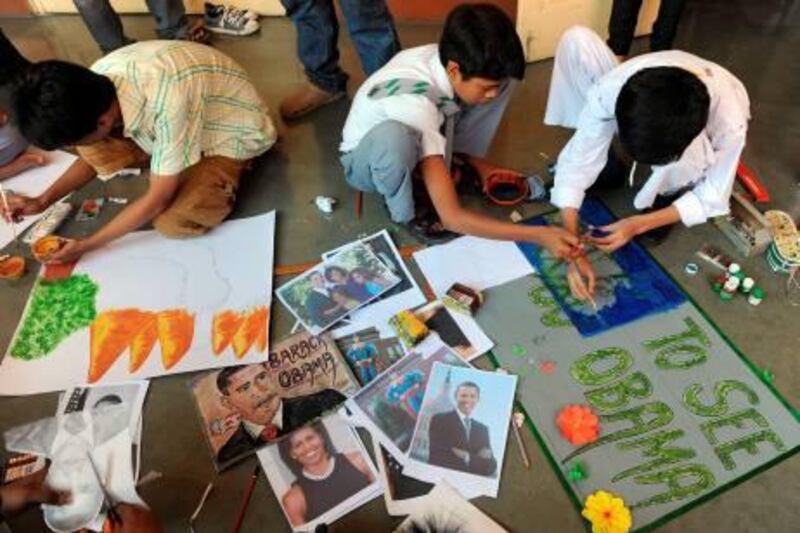Barack Obama will have a grand, memorable and successful visit to India merely by turning up.
Despite misgivings among some of New Delhi's political, military and business elite, Mr Obama remains immensely popular in India.
Many Indians are inspired by his life story, and many more are impressed by his style, personality and oratory. So expect a groundswell of good wishes for him when he arrives in Mumbai on Saturday. In addition to being feted at official functions, Mr Obama will be welcomed by India's raucous billboards, sand sculptures, T-shirts and the quintessential Amul butter advertisement.
It would be easy to understate the importance of these "atmospherics" and get caught up in the geopolitical, economic and commercial issues that tug at ties between the two nations. That would be a mistake.
Despite their differences, there is a powerful force drawing India and the United States together. The fact that both countries are democracies has created powerful political constituencies pressing the two governments towards each other.
Two of three Indians polled have a favourable opinion of the United States, according to the Pew Global Attitudes Project. In fact, 73 per cent of the Indians surveyed said they have confidence in Mr Obama, compared to only 65 per cent of the Americans.
Americans return the favour. A recent Gallup poll reveals two-thirds of Americans have a positive opinion of India, with younger people even more favourably disposed. Pro-India lobbies in Washington and pro-America lobbies in India are strong and growing more numerous.
This does not translate into New Delhi and Washington taking identical positions on all issues, but it does allow them to have policy disagreements without jeopardising the relationship.
So, just like Prime Minister Manmohan Singh's state visit to Washington last year, President Obama's trip should be seen as both acknowledging and reinforcing this shared democratic legacy.
White House officials have been at great pains to describe the visit as focused on Mr Obama's effort to create jobs. They have pointed out that India is the second-fastest growing foreign investor in the United States (after the UAE) and that Indian companies support more than 57,000 jobs in America.
The US-India Business Council estimates that deals signed during the trip could create or sustain as many as 100,000 jobs in the United States. While they got that part of the messaging right ahead of the mid-term congressional elections, the Obama administration's defensiveness over the issue of outsourcing reflects its inability to appreciate that it ultimately benefits US consumers, especially during hard times. This remains a concern for India's highly competitive services industry.
Indian analysts, however, are aware that creating jobs in the US is important to India. As V Anantha Nageswaran, geoeconomics fellow at the Takshashila Institution, suggests, Indians should not complain much about American protests against outsourcing and instead "buy more stuff" from the US that Americans are "still good at making".
If the hot-button political issue in Washington is unemployment, in New Delhi it is terrorism. US authorities have extended co-operation - albeit, not to the extent that their Indian counterparts desire - over the investigations into David Headley's involvement in the 26/11 attacks on Mumbai.
With Mr Headley's confession to US interrogators, allegedly implicating Pakistan's spy agency, it is no longer possible for Washington to plausibly pretend that terrorism has no official sanction from Pakistani state institutions.
Now, by deciding to stay at the Taj Mahal hotel in Mumbai and to meet victims of the terrorist attack, Mr Obama has done well to signal his empathy, if not solidarity, with the Indian people. However, he will not be spared tough questions on his administration's equivocal attitude towards the source of that terrorism.
After struggling for nearly two years to recalibrate US relations with Islamabad, the president has come full circle: he accepts that the Pakistani military-jihadi complex will yield only so far to US demands. He also has travelled from believing that the United States and China can form a global power duopoly to recognising that a strong partnership with India is critical to US interests in Asia.
So when he travels to India on Saturday, both Washington and New Delhi share a renewed and common understanding of the problems they face. Where they differ is on what the solutions ought to be.
That, however, won't spoil the party.
Mr Pai is a fellow for geopolitics at the Takshashila Institution and editor of Pragati - The Indian National Interest Review






